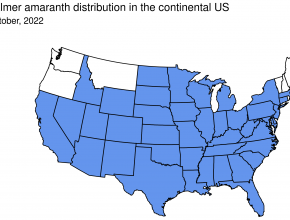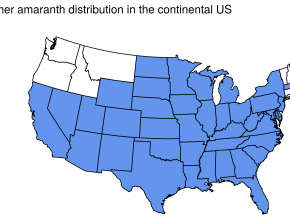
Updated Palmer amaranth distribution
State-level distribution of Palmer amaranth (Amaranthus palmeri) as of October 12, 2022. Data assembled by Andrew Kniss.
Updated Palmer amaranth distribution Read MoreThoughts from someone who spends life amongst the weeds

State-level distribution of Palmer amaranth (Amaranthus palmeri) as of October 12, 2022. Data assembled by Andrew Kniss.
Updated Palmer amaranth distribution Read More
Palmer amaranth is native to the southwestern United States, and has been recognized as a problematic weed in the southwest and southeastern US for many years. Each year, this species seems to move further north. I’ve been trying to keep an accurate state-level distribution map for this weed, and thought I’d post it here for anyone else who might be interested. Data sources: PLANTS database (https://plants.usda.gov) California, Nevada, Utah, Arizona , Colorado, New Mexico, Nebraska, Kansas, Oklahoma, Texas, Wisconsin, …
Palmer amaranth – current state-level distribution in the US Read MoreLast August, an article was published in New Phytologist that claimed a transgene added to rice could increase the fitness of a weedy relative. The paper was covered in the media pretty widely. When I read the paper, I didn’t think the authors presented nearly enough data to support their conclusions. You can find my criticisms in detail here. I think it is worth revisiting this paper now for a couple of reasons. The first is that two formal criticisms …
Fitness of herbicide resistance genes revisited Read MoreAs I was updating information on herbicide resistant weeds for class this week, I wanted to find some hard numbers on the large-scale impact herbicide-resistance can have. Obviously, my first thought was to find information on cotton production in the South. Glyphosate-resistant Palmer amaranth has been something of a poster child for the potentially devastating impacts of herbicide resistant weeds in the last few years. It has been dubbed a “superweed” by many, including Nature News, the New York Times, …
Large-scale impacts of herbicide-resistant weeds Read MoreIn a recent issue of Nature, Natasha Gilbert took “A hard look at GM crops.” Ms. Gilbert states: “it can be hard to see where scientific evidence ends and dogma and speculation begin.” “Researchers, farmers, activists and GM seed companies all stridently promote their views, but the scientific data are often inconclusive or contradictory. Complicated truths have long been obscured by the fierce rhetoric.” I agree wholeheartedly. Especially when browsing the internet, there is a lot of misinformation, half-truths, and …
Where are the super weeds? Read More